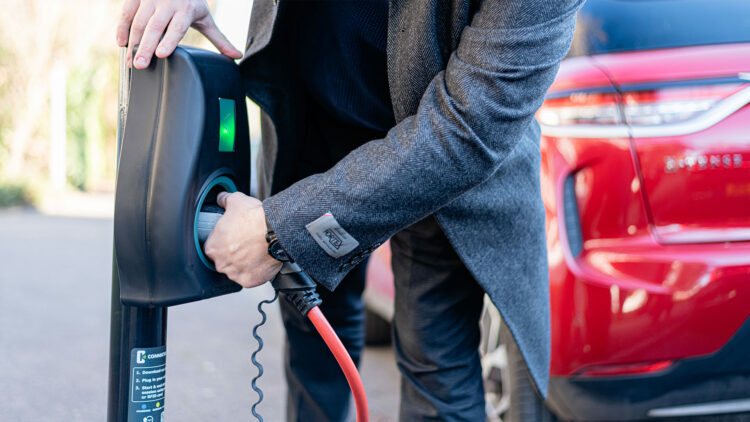West Sussex County Council has been awarded £5.5 million from the Office for Zero Emission Vehicles to install up to 1,000 additional public charging points in the area. What sets this project apart is that part of the budget will be used to establish the infrastructure for an additional 400 chargers in the future, potentially saving the public a significant amount of money. Connected Kerb will provide additional funding and install and operate the charge point network. The council is also seeking input from local households to determine the best locations for the chargers.
Councillor Joy Dennis, who has spearheaded the installation project, stated that the funding will greatly benefit the residents of West Sussex by making on-street charging more accessible for those without off-street parking. The aim is to enable sustainable transport options across the county and support the government’s objective of carbon-neutral travel.
The council’s Electric Vehicle Strategy aims to increase the availability of charging infrastructure in areas where on-street parking is prevalent. However, there is uncertainty about the pace of change and future consumer behavior. The plan will need to be flexible to adapt to changes in consumer preferences and emerging technologies such as hydrogen. The proximity of West Sussex County to major ports presents additional opportunities for transportation.
The emergence of Connected and Autonomous Vehicles (CAVs) may also impact the transport network during the plan’s lifespan. The council will monitor progress in this area to position itself to take advantage of opportunities that may arise. The council is forward-thinking and recognizes the potential revenue opportunities presented by autonomous driving electric vehicles.
Overall, the West Sussex County Council’s initiative to install additional public charging points demonstrates its commitment to sustainable transportation and reducing carbon emissions. The collaboration with Connected Kerb and the involvement of local residents in determining charger locations highlight the importance of public-private partnerships and community engagement in achieving green objectives.
Installation of 1,000 EV Charge Points Planned in West Sussex
West Sussex, known for its picturesque landscapes and commitment to sustainable living, is taking yet another step towards becoming a leader in the transition to clean energy. In a groundbreaking initiative, the local council has announced plans to install 1,000 electric vehicle (EV) charge points throughout the county. This ambitious project aims to encourage the adoption of electric vehicles and tackle the challenges surrounding the lack of charging infrastructure.
Electric vehicles have rapidly emerged as a crucial solution to combat climate change and reduce air pollution. As the world shifts its focus towards sustainable alternatives, facilitating EV adoption becomes paramount. However, one of the main barriers hindering the wider uptake of electric vehicles is the limited availability of charging stations. Recognizing this obstacle, the West Sussex council has taken a proactive approach, working towards creating an extensive charging network that will rival any in the country.
The installation of these 1,000 EV charge points will be strategically deployed throughout the county, prioritizing locations with high demand, such as city centers, shopping precincts, and residential areas. This well-thought-out placement aims to provide EV users with convenient access to charging facilities, significantly reducing range anxiety and offering reassurance to potential EV owners.
The benefits of this initiative extend well beyond environmental considerations. The introduction of the charging infrastructure will also establish West Sussex as an attractive destination for electric vehicle drivers, benefiting the local economy by attracting green-minded visitors. Furthermore, the project is expected to generate new jobs in the area, from installation and maintenance to customer service roles, helping to boost employment rates and foster economic growth.
To ensure the successful implementation of the project, the local council is partnering with private charging infrastructure providers and investing in advanced technology. These partnerships will guarantee a robust and reliable network, capable of meeting the increasing demand for EV charging as more drivers switch to electric vehicles.
While the installation of 1,000 EV charge points signifies a significant achievement, the council’s commitment to sustainability does not end there. West Sussex aims to go beyond conventional charging infrastructure by exploring innovative technologies such as rapid charging, wireless charging, and renewable energy integration. By embracing cutting-edge solutions, the county hopes to create a future-proof charging network that evolves alongside emerging industry trends.
The project also aligns with the national government’s vision of making the UK a global leader in electric vehicle adoption. The recently announced ban on the sale of new petrol and diesel cars from 2030 necessitates an extensive and reliable charging infrastructure. West Sussex, with its trailblazing plans, is positioning itself at the forefront of this transformation, setting an example for other local authorities across the country.
In conclusion, the installation of 1,000 electric vehicle charge points in West Sussex demonstrates the county’s commitment to the transition to cleaner and greener transport. This ambitious project not only addresses existing barriers to EV adoption but also drives economic growth and enhances the county’s reputation as a sustainable destination. By investing in cutting-edge technology and strategic partnerships, West Sussex is well on its way to providing a charging network that meets the increasing demand for electric vehicle infrastructure. With this groundbreaking initiative, West Sussex leads the way in shaping a more sustainable future for transportation in the UK.

